|
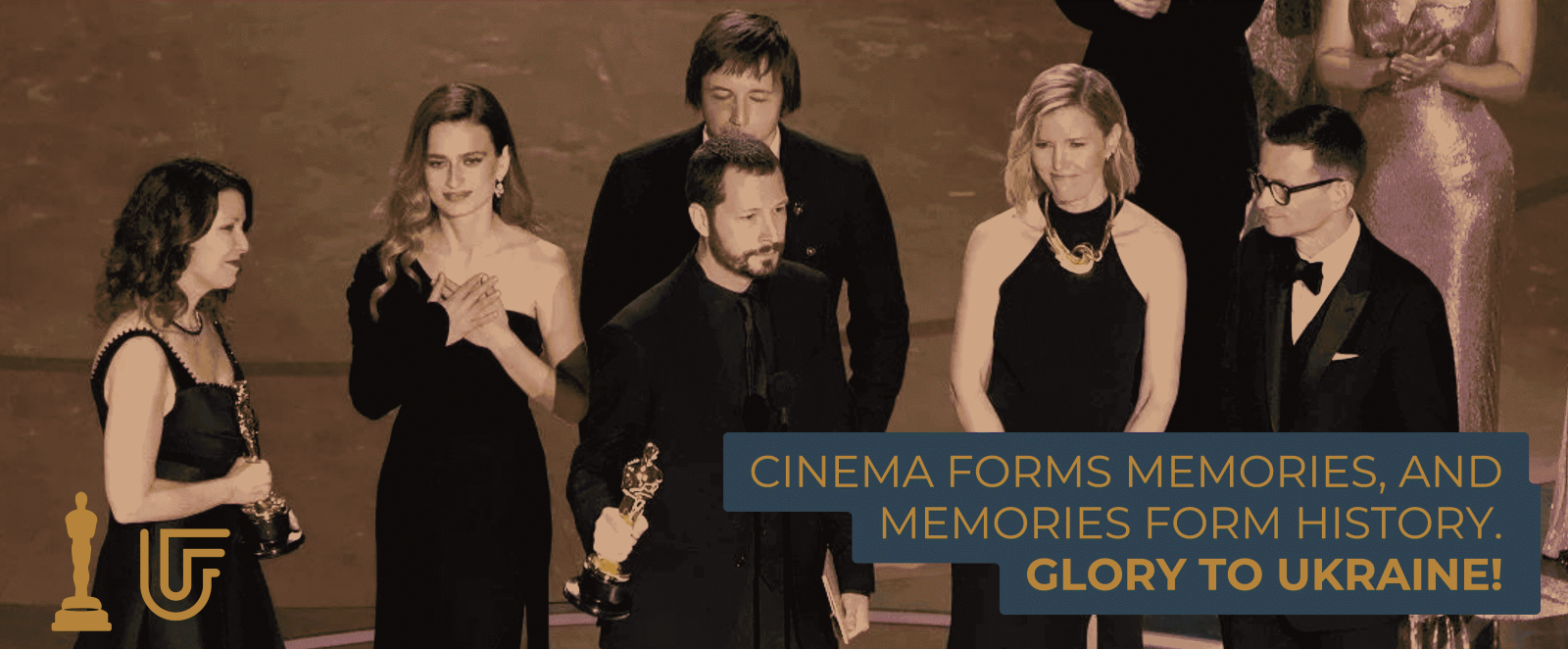
|
|
The team of 20 Days in Mariupol wins an Oscar for Best Feature Documentary. AP Photo / Chris Pizzello
|
|
Dear UFF Friends and Supporters,
|
|
This year’s Academy Award-winning documentary, “20 Days in Mariupol,” directed by Mstyslav Chernov, captures the devastating early days of the siege in Mariupol, offering an unfiltered glimpse into the human cost of war.
UFF has a longstanding relationship with the employees of the Training Center of the National Police in the Donetsk region, where Mariupol is located. In December 2022, we extended our support through humanitarian aid. Among these heroes is Volodymyr Nikulin, who risked everything to evacuate journalists Mstyslav Chernov and Yevhen Maloletka from besieged Mariupol, ensuring their safety and the continuation of their crucial work.
|
| |
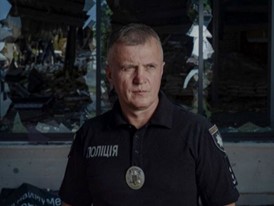 |
|
Volodymyr Nikulin recalls:
“I met Mstyslav and Yevhen on March 9, 2022, when the Russians dropped a bomb on the maternity hospital. I realized that these guys would need help because they were filming how occupiers destroying the city. Journalists lived with us in the Police Department, and we went together to places where the Internet was still available and sent the footage. We were motivated by the fact that these materials were shown in international news. This gave us hope that Mariupol had not yet been forgotten.”
|
|
|
|
|
|
|
|
|
|
|
Policeman reflects on the significance of “20 Days in Mariupol” and what impact this film made: “Looking back, I realize that we chose the right day to leave the city. The Russians were looking for journalists because of the footage, and we would not have left the next day. This film will remind us of the history of Mariupol at the beginning of this terrible war…
The truth is the same weapon. With this truth, my friends dealt a strong blow to the occupiers. For me, the biggest reward is that the world remembers Mariupol and all the victims…
This movie is proof that we are capable of resisting, we are capable of fighting and winning.”
|
| |
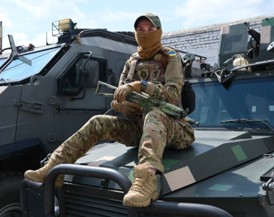 |
|
A close colleague of Volodymyr, one of the policewomen, shared her exclusive story with us: "My call sign is "Ravlyk" (“Snail” in English), I was a member of Mariupol's Special Police Unit during the war's outbreak, and my duties shifted from law enforcement to aiding civilians amidst escalating violence. Initially tasked with maintaining order and protecting residents from looters, our responsibilities expanded as the bombardment intensified. Mariupol lost essential utilities, plunging into darkness and chaos as people sought refuge from relentless attacks".
|
|
|
|
|
|
|
|
|
|
|
Despite challenges, we distributed food, water, and medical supplies, hampered by attacks on critical infrastructure. With police operations halted, we allied with local defense units to repel Russian forces. Amid constant airstrikes and artillery fire, we risked our lives to provide for the city.
People were living in basements because ship artillery was firing in some areas. It was very scary, because one volley could destroy a high-rise building to the ground. But the hardest thing was, of course, the Air Force. Unfortunately, we were powerless in the sky, as our aircraft were no longer flying over Mariupol.
When the Russians bombed the State Emergency Service, the rescuers were left with their bare hands, all their equipment burned down and they were no longer able to clear the rubble and rescue people. That was my biggest fear - to die under the rubble, knowing that no one would save me. I can't imagine how many bodies are still buried under the rubble of high-rise buildings, how many people are still buried in their own yards and mass graves.
|
|
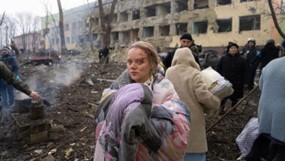
|
|
A pregnant woman is evacuated from a destroyed maternity hospital in Mariupol on March 9, 2022.
AP Photo / Yevhen Maloletka
|
|
|
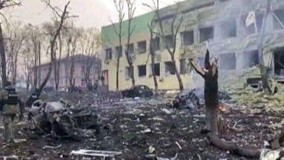
|
|
An archive photo from Snail's body camera. Maternity hospital in Mariupol, March 9, 2022.
|
|
|
|
|
|
|
|
|
|
|
We must pay tribute to the doctors of Mariupol: despite the fact that they worked for days without sleep and rest, they never refused to help everyone we brought. Once a bomb fell 100 meters from the 3rd hospital, meaning that the Russians deliberately targeted facilities with many wounded. To kill as many Ukrainians as possible at once.
I would also like to point out and dispel Russian fakes that they only fired at military targets. This is not true. They fired indiscriminately at everything, the bombs fell absolutely randomly.
|
|
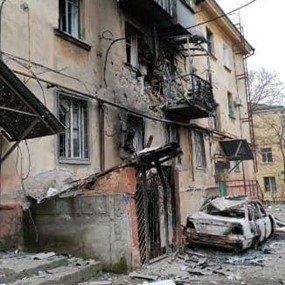
|
|
One of the houses on Nakhimova Ave. where we brought food to the basements for civilians. The shelling happened 20 minutes before we arrived.
|
|
|
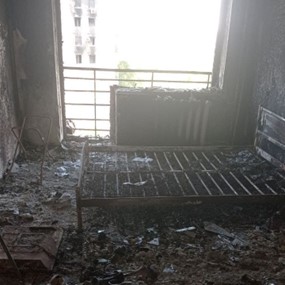
|
|
This is my parents' apartment. Russians burned 3 entrances out of 4 in our house in the spring of 2022. In the summer of 2023, these 3 burned entrances were demolished.
|
|
|
|
|
|
|
|
|
|
|
Leaving Mariupol was chaotic, with civilians lacking organized evacuation plans. Military warnings threatened arrest for officers attempting to leave. On February 25th, I urged my family to escape, knowing our uncertain fate.
On March 25th, as we left Mariupol, communication was briefly restored, and I was able to reassure my loved ones I was okay. However, I faced "administrative arrest," with vague terrorism charges. Four of us remained captive, planning an escape from Manhush.
Fleeing to Berdyansk, we navigated armed checkpoints, enduring intense scrutiny. Each checkpoint posed a threat, scrutinizing passports and tattoos against wanted lists. Opting for safer routes, relief came hearing Ukrainian spoken at the twentieth checkpoint, signaling that we returned home."
|
|
The defense of Mariupol lasted 86 days.
82 of 86 days were spent in complete encirclement.
|
|
You can witness the truth by watching “20 Days in Mariupol”, available for free on American YouTube. Let this film honor the memory of those who died and serve as a reminder of what Russia stands for and what sacrifices it is capable of for the sake of its aggressive ideas.
|
|
Stand with us!
Stand with Ukraine!
For donations or further information, please visit our website.
|
|
|
|
For Freedom and Victory,
UFF Team
|
| |
|
|
|
|
 USUBC COLLECTION OF OVER 160 UKRAINE HISTORIC NEWS PHOTOGRAPHS 1918-1997
USUBC COLLECTION OF OVER 160 UKRAINE HISTORIC NEWS PHOTOGRAPHS 1918-1997
 "HOLODOMOR 1932-33: THROUGH THE EYES OF UKRAINIAN ARTISTS" - COLLECTION OF POSTERS AND PAINTINGS
"HOLODOMOR 1932-33: THROUGH THE EYES OF UKRAINIAN ARTISTS" - COLLECTION OF POSTERS AND PAINTINGS
 USUBC COLLECTION OF HISTORIC PHOTOGRAPHS ABOUT LIFE AND CAREER OF IGOR SIKORSKY PHOTOGRAPHS - INVENTOR OF THE HELICOPTER
USUBC COLLECTION OF HISTORIC PHOTOGRAPHS ABOUT LIFE AND CAREER OF IGOR SIKORSKY PHOTOGRAPHS - INVENTOR OF THE HELICOPTER
 Ten USUBC Historic Full Page Ads in the Kyiv Post
Ten USUBC Historic Full Page Ads in the Kyiv Post

 Ukrainian Freedom Fund
Ukrainian Freedom Fund






























